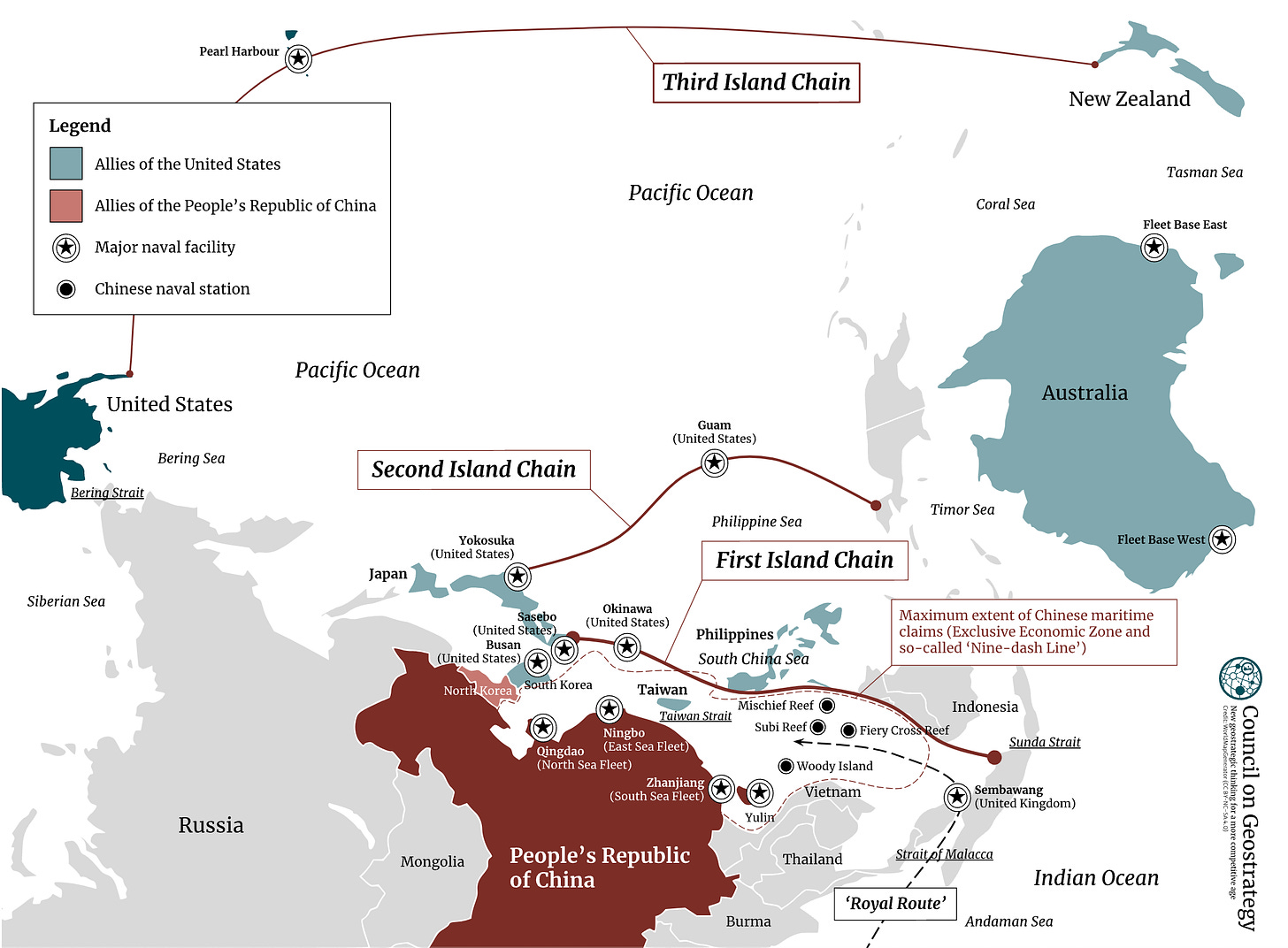See the Pacific from China's Perspective
if you were a PRC strategists, would you see anything different?
When trying to understand a problem on the global stage, never forget - get yourself to a globe, map, or googleearth…in that order, and then start to ponder.
With the People’s Republic of China (PRC), traditional maps do not give justice to how they view the Pacific. This perspective will cure that problem.
They have exactly the opposite maritime view as the United States. We have broad, open access to the Atlantic and Pacific Oceans. The PRC, on the other hand, is facing what from a distance is a series of barrier islands held by unfriendly powers.
Of course they want Taiwan - that secures the center and opens the door to the rest of the world where all they have to worry about are their flanks.
When I saw Charlie’s reference to this chart in Peter Alan Dutton’s article in Britain’s World titled, Oceans under pressure: China’s challenge to the maritime order, I figured it was worth the read.
It seems like an UNCLOS brief, but besides the nice map, there are a couple of important points worthy of your time.
The PRC upends completely the rules and principles of UNCLOS for claiming and delimiting maritime zones. To begin with, the PRC’s nine-dash line claim in the South China Sea (see Map 1) is entirely divorced from the cardinal principle that the land dominates the sea. Based on this line, the PRC asserts historic rights to roughly 2.7 million square kilometres of water space. This staggering claim was considered and rejected fully in 2016 by the panel of international law judges and experts which formed the arbitral tribunal in a case against the PRC initiated by the Philippines. These experts determined that Beijing’s claim has no basis in international law, and yet since 2016 the PRC has escalated its use of coercion to force acceptance of its claims. The effect is to deny Vietnam, the Philippines, Malaysia, and Indonesia the resource rights which international law unambiguously allocates to them.
…
As a state with substantial power and influence in the international system, the PRC is inherently, and inescapably, a rule-maker. In breaking down the careful tradeoffs in UNCLOS, the PRC creates room for others to follow its approaches and threatens to reverse historical advances in maritime order.
The United States supports UNCLOS but frustratingly remains outside it. Push back inside the convention’s institutions therefore must come from the UK, Australia, Japan, India, France, and others with substantial maritime interests. Otherwise, rather than being a century of maritime tranquillity, the years ahead will see a detrimental reversion to maritime instability.
The penultimate paragraph … there’s the rub. The “international system.”
Another name for the international rules based order everyone likes to be so concerned about, well, the PRC has never cared much for it as they had no say in creating it.
They want something else … and you don’t have too look hard to see how they’re building it.





"International law"...a framework of agreements with no central enforcement mechanism, touted when it aligns with a particular party(s) interests, and ignored when it doesn't. Human behavior 101: Activities that generate reward for the actor, punish others without punishment for the actor, will continue and likely increase. Present day piracy and China's activities in the nine dash region are generating rewards for the actors with little actual punishment other than "international law of the sea" rulings and occasional isolated military responses. QED: Such activities will continue and likely increase until enough injured actors band together and pushback meaningfully in the nine dash region and hang a few pirates. Current trends argue against holding one's breath until either behavior modification occurs.
Putting my toe in the water (pun intended), I get it. Every nation, like every individual, sees the world from its perspective, the obvious view of the natural man. And applying Gideon’s First Law of Sociology on a grand scale, no nation sees themselves as the bad guy. (We will set aside the seemingly eternal self-flagellation of the American Left for sake of discussion.). The question is what then does the natural man do with this train of thought? If constrained only by force, and without a belief in absolute truths and a higher power, but with an abundance of historical international abuse and its resulting prickliness, we get aggression and war. In this manner, PRC equals Russia.
The United States and everyone in the first island chain and beyond (looking at you, Australia) sees PRC as a bully - because they are *acting* like a bully. Aggression, in itself, needs no further analysis. Effective responses do. Successive White House occupants, State Department denizens, and DoD have all failed to hold the line. The time to have stopped PRC build up of minor coral reefs clearly in the EEZ of their neighbors was the day they showed up with construction equipment. We fumbled the ball. Period. The question is what to do now. One option, only one of many possible, is to treat the re-supply of those armed outposts the way the PRC have responded to the re-supply of the Philippine outpost on Second Thomas Shoal. That would be very hard to do for any number of reasons. What we *can* do is be part of the Philippine Coast Guard’s efforts at Second Thomas Reef, and everywhere else PRC is trying to make inroads.